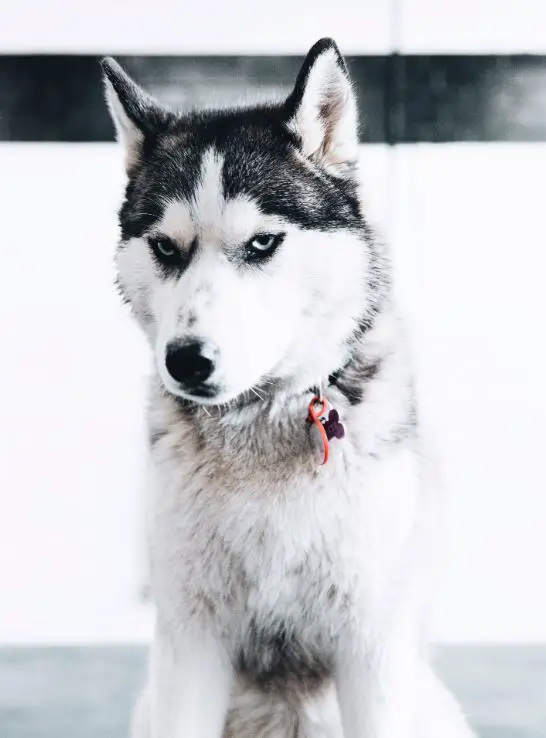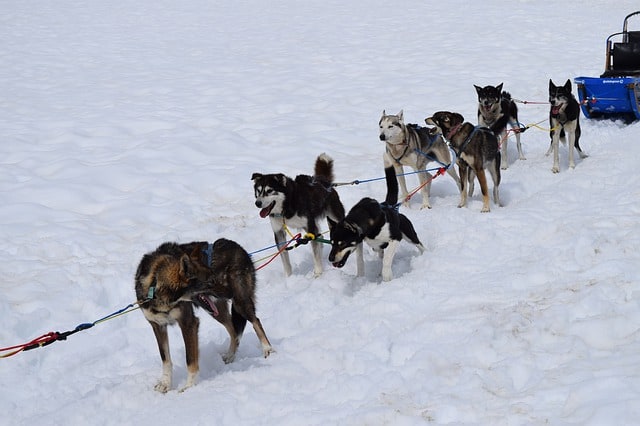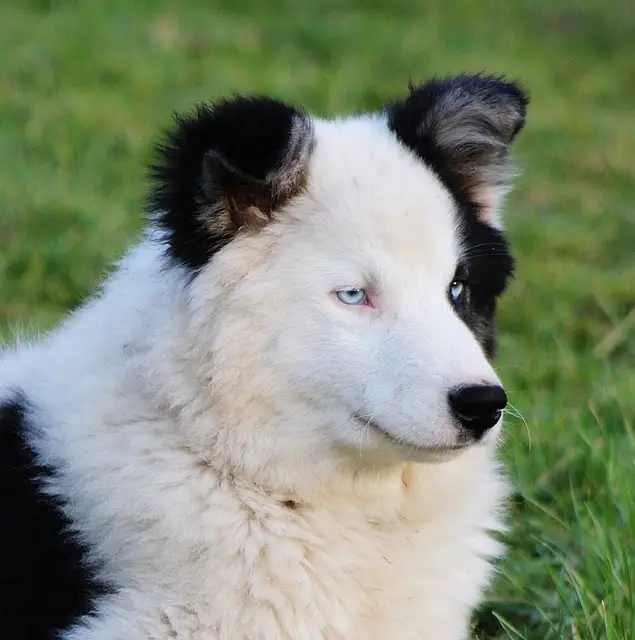Siberian Huskies were bred originally as sled dogs that worked extremely hard pulling their weight and supplies as a team. They can and did hold up to intense bitterly cold temperatures in blizzard-like conditions.
Today the Siberian husky is quite a popular breed and makes an excellent family pet. They must be cared for and trained properly as a puppy for them to become the friendly, social creature they were meant to be. They also must be loved so they feel accepted into your family.
A husky’s disposition can be quite unique so in this article I will cover the history of the Siberian husky, allowing you to know more about their behavior as well as their temperament and personality.

For your dog’s vitamin supplement, food, toys, or other dogs product please visit the Sundays for dogs website.
Siberian husky history
As their name implies, the Siberian husky originated in the vast northern area of Russia, known as Siberia. The first to breed these sled dogs were the Chukchi, an indigenous people who lived around the Okhotsk Sea on the Chukchi Peninsula.
The Chukchi had to seek out new hunting grounds. They needed dogs to pull their provisions by sled, but the dogs had to be well-oriented to destinations as well as be strong for pulling great weight.
They also needed to withstand the winter weather that was harsh, snowy, and extremely cold temperatures and to survive with strength on very little sustenance.
The dogs that the Chukchi bred, were proven to be excellent specimens for the job as well as friendly companions to family and children.
Originally, these dogs were known as Chukchi sled dogs. The huskies of today are somewhat different but the DNA they possess is the same as the sled dogs of centuries ago.
Huskies also took their place in history in Alaska in 1908. A team of huskies competed in a dog sled race that was the first race of its kind.
Many were skeptical because huskies are not very large dogs like their cousins the Alaskan malamute.
The race was from Nome to Candle, which is an impressive 408 miles. The Huskies won the race and it took 119 hours to complete.
Huskies also became quite the heroes in 1925 as they ran in the “Great Race of Mercy,” which was not a competitive race at all but a race to take the diphtheria antitoxin 674 miles to Nome, Alaska, where it was desperately needed.
The weather was harsh with ice and snow and was impassable for any other type of transportation. 150 dogs and 20 mushers took part in this valiant race.
Siberian Huskies also were members of the United States Army in WWII, serving in the search and rescue unit of the Air Transport Command.
To check your Siberian Husky puppies’ health status or their DNA checks, please visit the Embark vet website for all the help you may need.

Siberian Husky Breed
If you are considering getting a Siberian husky puppy, you may like to know what the grown-up husky will be like.
The Siberian Husky is in the working category for dog breeds and is of medium size with females weighing 35lbs to 50lbs and males, 45lbs to 60lbs.
They have a double coat that is thick and provides plenty of insulation that guards well against the elements. Their coat can be pure white to black and many have various markings.
Being a descendant of the Chukchi sled dogs, they are a cousin to the Alaskan malamute, who also descended from the same dogs. The malamute, however, is weightier at 75 lbs to 85 lbs.
The Siberian Husky is a very friendly and social fellow and makes an excellent family pet. The Chukchi had raised these dogs with children and that instinctive personality still exists in the breed. The ASPCA states that they are a breed that is good with children.
Husky Puppies – Temperament and Personality
Siberian Huskies are so adorable and sweet. They are a breed like no other. Puppies may be timid at first but keep in mind, that this is the first time they are away from their mother and littermates. They may be scared and lonely.
Huskies are pack animals, used to sleeping with their pack for companionship and warmth.
Husky puppies are affectionate, friendly, and generally welcoming to all people and dogs. Rarely are they ever aggressive? They are good-natured and you can even say free spirits.
Puppies love the outdoors, especially in cold weather and they love to play, never losing that playfulness, even as an adult.
Husky puppies need plenty of exercise and training as well. They have an instinctive need to run, so being on a leash or in a fenced-in area is a necessity. If something distracts them and catches their eye, they will be off and running.
Even though these pups have so many pluses, they can, at times, have a temperament that is quite independent.
This is why training is imperative especially when they are puppies, so problems don’t arise later on. Even though they are friendly and love everyone, huskies can be stubborn and quite willful.
They do need an owner that is consistent, sets the rules and boundaries, and then sticks with them.
Huskies are also a type of Harry Houdini breed, being excellent escape artists. As a puppy and sometimes an adult, they can squeeze through very small spots.
They can also jump unusually high, so if you have a baby gate and are quarantining them in a certain area, be aware as your puppy grows.
If you’re getting a husky puppy and you have your sights set on a guard dog; forget it. They are not the right make-up for guarding your silver.
They may just lead someone right to the silver! They are much too friendly and they rarely, if ever, bark. They may howl, yip or whine, but no big bad bark.

Siberian Husky Puppies
Being that the Siberian husky was bred as a hard-working sled dog, their natural instincts are to run, play, and dig.
If you are considering a husky puppy, a few essential things are necessary for raising a friendly, happy, but obedient adult husky.
Training properly is one of the most important aspects of avoiding an unruly pup and helping nurture a well-mannered loving husky. Below are a few tips to help.
- Communication
When training your puppy, communicate clearly. Choose words that are short and sweet and only use them for the command you are giving.
If there are more members in your family, everyone should agree on the words you will use and stick with them. Huskies are very intelligent and will follow along.
- Routine
Start with a routine. Huskies are very consistent and routine-oriented, so this should be quite easy. Have a set schedule for meals, sleep, walks, and playtime.
Understanding that often a family’s schedule differs, try to keep things as regimented as possible, especially in the beginning.
Your pup should have its own space, whether a crate or a corner with a bed, blanket, toys, etc. Huskies are pack animals and have slept in dens in the past.
They do quite well with crate training as it is akin to a den and they feel secure and safe inside. Do not, however, use their crate as punishment. You only want their crate to be associated with positive things.
Routine, again should be practiced when housebreaking. Be consistent in taking them outside and always use the same area.
- Consistency
Consistency is the key to all training. When teaching your puppy, remember that one thing that is off-limits today should not be allowed tomorrow.
Giving them potato chips today and no potato chips tomorrow will only confuse them Potato chips should be a “no” every day; period. Don’t waffle.
You are the leader of their pack and their obedience will be your reward for being consistent.
- Behavior
Bad behavior must be discouraged. You can either use a firm “no,” if a puppy is misbehaving or remove attention.
Sometimes dogs, just like children, seek our attention by acting out. If the puppy is extremely rambunctious, nipping and jumping, simply walk away.
They will soon realize they’ve lost their playmate and gotten no attention. Never yell or use physical punishment. Be consistent and show that you are in charge.
Just as bad behavior needs to be dealt with, good behavior should be rewarded. If your puppy obeys commands, or when housebreaking, does his business outside, reward with exuberant positive praise and a treat if you like.
They will catch on quickly and realize they like the sound of your voice and your reaction better when they do something positive.
- Exercise
Exercise is necessary for husky puppies. They have high energy and need to release it. If your husky always walks and runs, you will avoid boredom and destructive behavior as well.
If your husky puppy, chews on furniture or digs relentlessly, they probably need more exercise.
A fenced-in ballfield or dog park is the answer. Keeping them occupied with toys alleviates boredom and chewing as well.
- Self-assurance and love
It’s very important that you show your puppy that you are in charge of the pack leader by being self-assured and confident.
Always give your husky much love and show kindness. There needs to be a happy medium between training and love.
Because of the Siberian Husky’s wonderful temperament, adding a puppy to your family would be a big plus. Know the breed before taking that big step.
They are intelligent, energetic, friendly, very affectionate, and aim to please. Sounds like a perfect combination.
